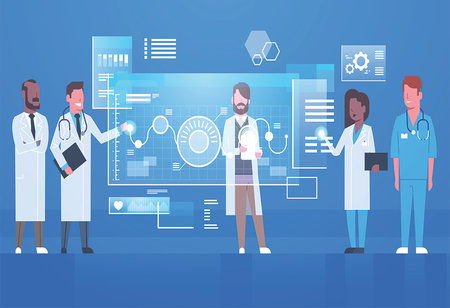How Technology Is Changing The Healthcare Sector?
By Disha Gogoi
 With the advancement of technology, technology has touched each and every aspects of modern life. The impact of technology in our daily life can be seen right from the way people engage with public transport in major cities to the ability it offers to cross-compare product and services before buying. In the US it is believed that the health IT sector alone is believed to be worth over 7 million dollars and with the numerous innovations coming out of the country’s lab is growing with each passing week, this is possibly just the tip of the iceberg.
With the advancement of technology, technology has touched each and every aspects of modern life. The impact of technology in our daily life can be seen right from the way people engage with public transport in major cities to the ability it offers to cross-compare product and services before buying. In the US it is believed that the health IT sector alone is believed to be worth over 7 million dollars and with the numerous innovations coming out of the country’s lab is growing with each passing week, this is possibly just the tip of the iceberg.
But the question is what is these health technology developments and what sector or areas of healthcare have been mainly revolutionized? There is no doubt that technology is providing patients with the chance to live longer, happier, and enjoy their lives every single day, whether it’s specific tech developments such as eye health tools, or broader innovations including IT-based health informatics. Below are the technology changes that are revolutionizing the healthcare system-
Mobile apps
In today’s world, there are apps for almost everything and healthcare apps are being developed for both healthcare and patient use. Doctors, tech gurus, and patient are all putting their heads together to discover new ways to monitor personal health. You can now count your calories’, monitor your heart rate even track your daily sleep patterns and diets. For instance, the Apple watch is a biomedical device that helps users monitor, and measure diet, fitness, and sleep data.
Cloud EHRs
Cloud-based services eliminate the need for local storage, such as a server or traditional desktop computer by using the internet to store and access information. Cloud-based Electronic Health Records (EHR) offers a basic, simplified and centralized system which is easy to implement and convenient to use. It also allows the health care IT departments to cut cost through limited maintenance fees and zero licensing and update costs. In addition, as could-based EHR systems do not require constant software and hardware installations, repairs or updates it minimizes the size of the IT staff and budget. Patients can also have access and manage their own healthcare information through the healthcare organization’s cloud-based system.
Data Analytics
Data Analytics is the most significant tools for transitioning the health care system from profit-based care to value-based care. In the healthcare sector, data is everything. Right from analyzing diagnostics reports to patients treatment records healthcare facilities are bursting at the seams with information. Health care administrators are able to streamline workflows, increase patient satisfaction and reduce costs and wait times. Data analytics HER program allows healthcare administrators’ to repeatedly monitor the data information in order to improve efficiency and patient care.
3-D printing
3-D printing applications in the healthcare industry are incredible. Currently, the 3-D application was used by the surgeons and doctors of Los Angeles Medical Center by using a 3-D printer to create a replica aorta and use it as a model to guide and prepare for a patient that came in with a tear in their aorta.
The healthcare industry is reliant on the advancements in technology to improve the quality of patient care. Technological growth is offering excellent benefits to patients, increase efficiency and also helps the health care professional with their difficult jobs.




